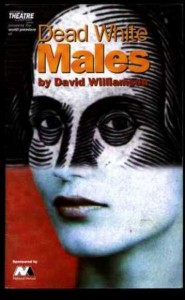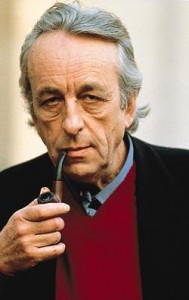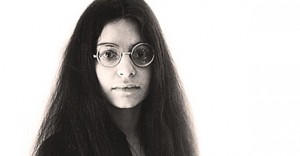Dead White Males
Dead White Males by David Williamson:
 This page of resources and links has been assembled to supplement class resources given to you by your English teacher.
This page of resources and links has been assembled to supplement class resources given to you by your English teacher.
What does the title mean?
Dead White European Male
noun
- a man whose importance and talents may have been exaggerated because he belonged to a historically dominant gender and ethnic group (Dictionary.com)
…..
A liberal epithet directed at the men who founded the United States of America. It can also mean anyone from history who made a positive contribution to western civilization.
“I don’t need to study American history. It’s just about a bunch of dead white guys. “
“In order to be on American money, you have to be a dead white guy. “
“What did Albert Einstein know? He’s just a dead white guy.” (Urbandictionary.com)
…..
The phrase “dead white males” (or “dead white men,” “dead white guys” etc.) criticizes the emphasis on high culture in Western civilization in academia (especially those in the United States). Critics of the traditional curriculum argued that it enshrined a world view that valued older European history and ideology, for example, over non-European achievements. (Wikipedia.com)
…..
822 WIL Dead White Males by David Williamson
DVD0914 What I wrote: Dead White Males, by David Williamson (Series 3, Episode 7), ABC, December 2015.
What I wrote, David Williamson (Ronin Films) particularly p.3, 4, 12.
The Play in production:
Dead White Males – 2012 Graduation Production of DFLL, NTU (Part 1 only)
A review of the Genesian Theatre’s production of Dead White Males
Summary of the play (Actor’s nauseum de)
…..
 The Author , David Williamson:
The Author , David Williamson:
David Williamson – introduction
David Williamson, writer (Australian biography)
Biography (Williamson’s website)
DVD0790 Facing writers: David Williamson
822.092 WIL:F Williamson, by Peter Fitzpatrick
822.09 CON Contemporary Australian drama: Perspectives since 1955, edited by Peter Holloway
…..
Literary Theories:
Feminist theory defines patriarchy as an unjust social system that enforces gender roles and is oppressive to both men and women. In feminist theory the concept of patriarchy is fluid and loosely defined. It often includes all the social mechanisms that reproduce and exert male dominance over women. Feminist theory typically characterizes patriarchy as a social construction, which can be overcome by revealing and critically analyzing its manifestations. Prior to the widespread use of “patriarchy”, feminists used the terms “male chauvinism” and “sexism” to refer roughly to the same phenomenon. (Wikipedia)
Feminist criticism (1960s–present): “An umbrella term for a number of different critical approaches that seek to distinguish the human experience from the male experience. Feminist critics draw attention to the ways in which patriarchal social structures have marginalized women and male authors have exploited women in their portrayal of them. Although feminist criticism dates as far back as Mary Wollstonecraft’s A Vindication of the Rights of Woman (1792) and had some significant advocates in the early 20th century, such as Virginia Woolf and Simone de Beauvoir, it did not gain widespread recognition as a theoretical and political movement until the 1960s and 1970s.” (Sparknotes)
Post-structuralism (1960s–1970s): “A movement that comprised, among other things, Deconstruction, Lacanian criticism, and the later works of Roland Barthes and Michel Foucault. It criticized structuralism for its claims to scientific objectivity, including its assumption that the system of signs in which language operates was stable.” (Sparknotes)
hu·man·ism n.
1. a. A system of thought that focuses on humans and their values, capacities, and worth.
b. Humanism A cultural and intellectual movement of the Renaissance that emphasized human potential to attain excellence and promoted direct study of the literature, art, and civilization of classical Greece and Rome.
c. The study of the humanities; learning in the liberal arts.
d. Secular humanism.
2. Concern with the interests, needs, and welfare of humans (thefreedictionary.com)
“Liberal humanism is a philosophical stance that highlights the agency and value of human beings, both individually and collectively. Liberal humanists prefer rationalism and evidence rather than religious faith or established doctrines.
Humanism is best described by its emphasis on the ability and responsibility of mankind to make cultural, technological and scientific progress without the help of any outside forces. Humanism is generally associated with progress based on empiricism and the lack of belief in a god or gods.
Humanism was first ascribed to the renaissance thinkers who studied primarily in the humanities. They believed that the human mind was capable of overcoming great obstacles and creating a better world for all mankind. Philosophically, humanism is tied closely to modernism, which understood the world to be objectively understandable. Humanism agrees with the Greek philosopher Protagoras when he said that man is the measure of all things.
To a humanist, mankind is not accountable to anyone higher than man himself; hence, humanists are known for their work on political philosophy, which seeks to understand how people are best governed. Humanism sees man as the most important being, as opposed to other beliefs that attach prime importance to a divine being. Further, humanism sees man as fundamentally good, which is in contrast to most religious systems that consider man to be evil or sinful. Humanism still exists today in various forms and is often associated with secular or atheist movements.” (Ask.com)
Patriarchal Ideology – “It is a sociological way of saying that our civilization is pervasively patriarchal (men hold the power, women are secondary); which is based on bias in power based on the socially constructed concepts of gender rooted in historical premises.” (Yahoo! Answers)
Patriarchy is a social system in which: males hold primary power; males predominate in roles of political leadership, moral authority, social privilege and control of property; and, in the domain of the family, fathers or father-figures hold authority over women and children. Many patriarchal societies are also patrilineal, meaning that property and title are inherited by the male lineage. The female equivalent is matriarchy. Historically, patriarchy has manifested itself in the social, legal, political, and economic organization of a range of different cultures. (Wikipedia)
……
Who’s who in Literature (in the play):
Shakespeare. (Biography Online)
Michel Foucault
Foucault (European Graduate School)
Michel Foucault (Britannica.com)
Louis Althusser (Britannica.com)
Louis Pierre Althusser (European Graduate School)
Terry Eagleton
Terry Eagleton (British Council. Literature)
John Fletcher
John Fletcher (Poetry Foundation)
Roland Barthes
Shulasmith Firestone (Notable Biographies)
Death of a revolutionary (New Yorker)
A Synopsis of some of Shakespeare’s plays
As You Like It
As You Like It (Sparknotes)
As You Like It (Shmoop)
The Taming of the Shrew (Sparknotes)
The Taming of the Shrew (Shmoop)
King Lear
King Lear (Sparknotes)
King Lear (Shmoop)
Othello (Sparknotes)
Othello (Shmoop)
Hamlet
Hamlet (Sparknotes)
Hamlet (Shmoop)
The Winter’s Tale
The Winter’s Tale (Sparknotes)
The Winter’s Tale (Shmoop)
…..
Hopi Indians (Wikipedia)
Britannica http://www.britannica.com/EBchecked/topic/271495/Hopi








